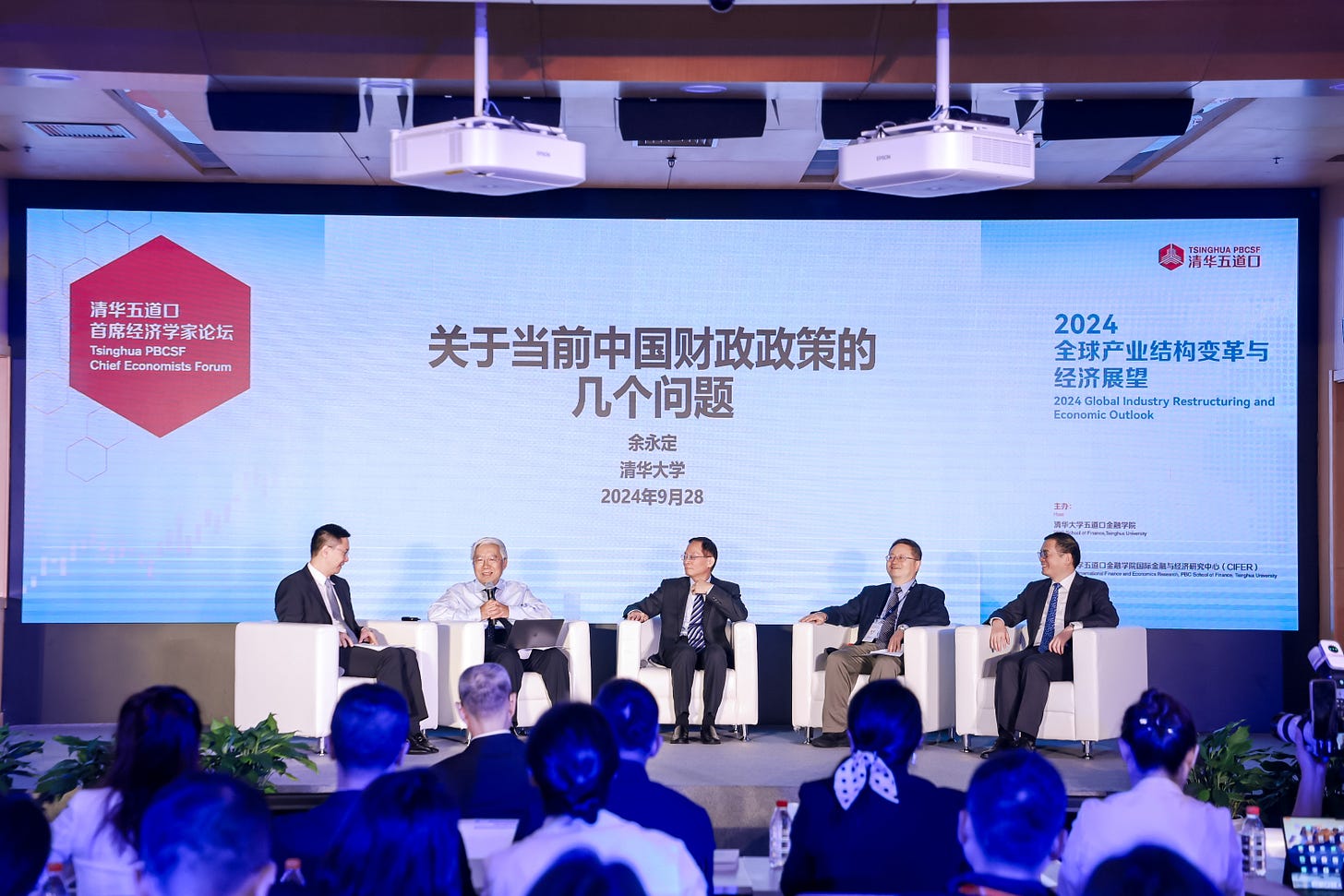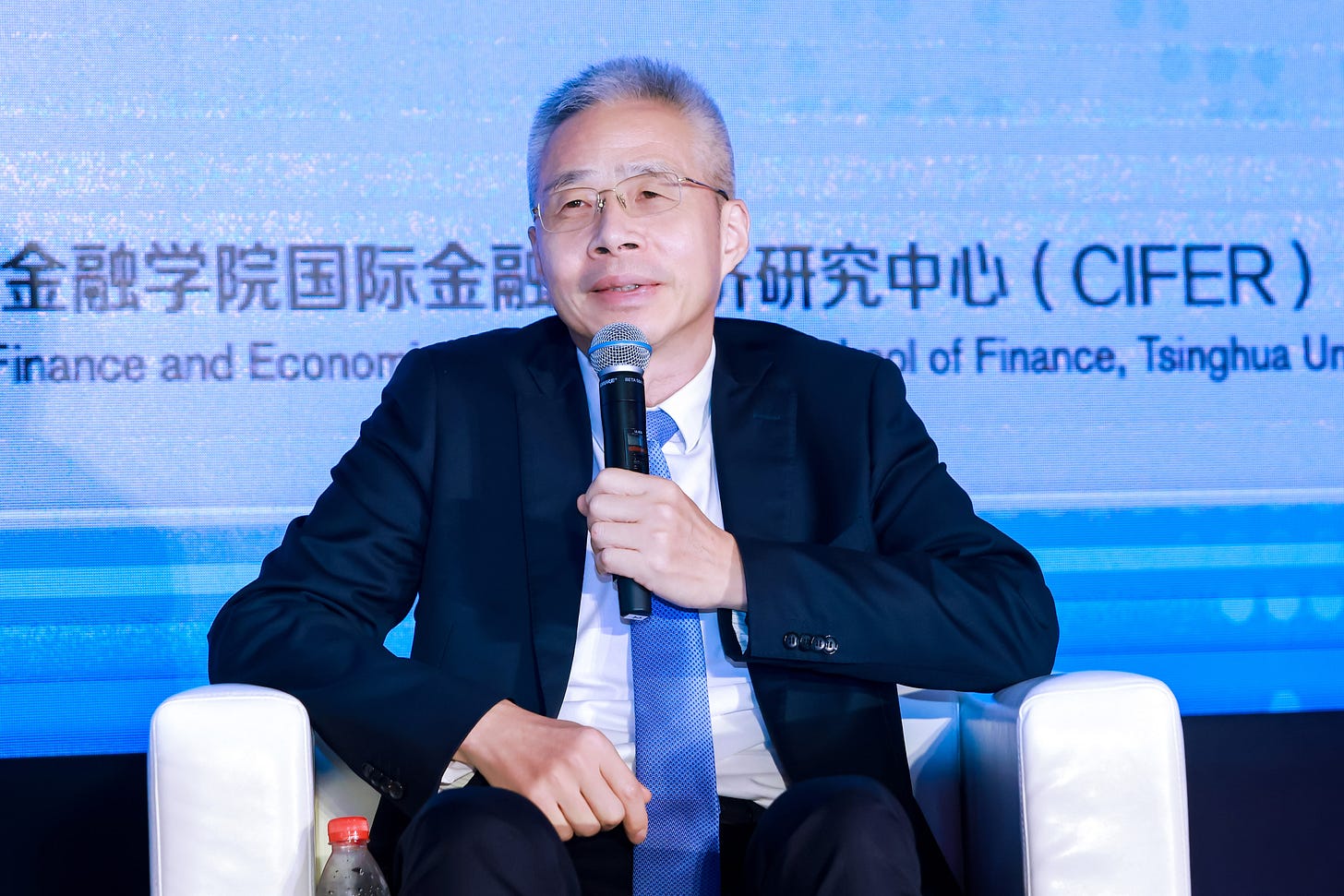The ball is now in Finance Ministry's court, Chinese economists say
The jury is still out.
We’ve all witnessed the Chinese stock market’s epic rally in the past several trading days. In one of the most beaten-down markets globally, the sentiment of FOMO - fear of missing out - followed unprecedented policy and signals from Beijing last week and obscured the mixed activity data, which includes the unofficial Caixin/S&P Global manufacturing PMI slipping from 50.4 in August to 49.3 in September.
Crucially, after the People’s Bank of China unveiled its biggest stimulus since the pandemic, which includes facilities to directly support the stock market, the ball is now in the Finance Ministry’s court, leading Chinese economists say.
And that is also why the first point of yesterday’s Bloomberg Opinion piece is on thinner grounds than it presents.
Three details jump out. First, the fiscal power. For the first time since 2018, the Politburo, headed by Xi, discussed economic matters in September, topics usually reserved for the April, July and December meetings. Boosting fiscal spending took front seat in the readout…
The latest Politburo readout emphasized fiscal spending and borrowing, including the issuance and deployment of ultra-long sovereign as well as special-purpose municipal bonds. It’s a sign that Xi is now aware why PBOC’s monetary easing has not worked.
The PBOC’s monetary easing took place on Tuesday, September 24, and the Politburo meeting on Thursday. While I have always dismissed the “one hundred year marathon” or “long game” characterizations of China’s policymaking, the insinuation that Beijing would course-correct after merely two days is apparently unfair, especially given that the PBOC’s decision could not have possibly been made without the approval of the Politburo's top leadership.
Yes, “Boosting fiscal spending took front seat” in the Politburo readout, which indeed “emphasized fiscal spending and borrowing, including the issuance and deployment of ultra-long sovereign as well as special-purpose municipal bonds.” But the tea leaf reading, always a tricky business, must go further to highlight the readout is still too broad and vague.
Don’t take it from me, take it from several leading Chinese economists who essentially said the same thing in public.
Yu Yongding, the senior government economist at the Chinese Academy of Social Sciences before retiring and former monetary policy advisor for the central bank, said on Saturday, September 28 in the Tsinghua PBCSF (People’s Bank of China School of Finance) Chief Economists Forum.
A few days ago, the central bank made a statement that I believe was quite positive. The overall direction is very correct, and it has received a lot of positive feedback. However, I now think the ball is in the Ministry of Finance's court. [Former Vice] Minister [of Finance] Zhu Guangyao has left [this forum], but if he were still here, I would ask him: what exactly is the Ministry of Finance planning to do? Because relying solely on the central bank’s measures, while they have indeed boosted morale, how long can this be sustained? The stock market has gone up, but if the Ministry of Finance cannot step up, the effectiveness of the central bank’s policies might begin to diminish.
So, now we are hoping to see some new actions from the Ministry of Finance. There are various rumors, but I cannot be certain, and I do not know if the Ministry of Finance has actually heard the calls from the market and made the necessary preparations. I simply do not know.
As I mentioned earlier, there is now a broader consensus that expansionary monetary policy is needed. The central bank has already done so much in terms of monetary policy for industrial financing. How much more can it do? At this point, I believe it can only go so far…
Sheng Songcheng, Adjunct Professor of Economics and Finance at CEIBS and head of the Financial Survey and Statistics Department at the People's Bank of China, said at the same meeting
Everyone is discussing how to increase income. How can fiscal policy be more proactive, and how can monetary policy coordinate with it? Professor Yu mentioned fiscal policy, and I also believe this is the right approach. Fiscal policy needs to be more proactive.
Ting Lu, Chief China Economist of Nomura
The fourth consensus is that there is no need to debate anymore - easing and stimulus should be increased…So, what policies are we really looking forward to going forward? I believe there is now a consensus that fiscal policy needs to take over. In fact, it relies on a combination of non-traditional monetary policy and fiscal policy. Some of the policies announced by three ministries on September 24th already fall into the category of non-traditional monetary policy, especially some of the policies aimed at the stock market, which are definitely non-traditional monetary measures.
Following their speeches, they also engaged in a discussion
Yu Yongding
I personally believe this is a big step in the right direction. It is inspiring and has played an important role in restoring confidence in the prospects of China's economic growth. However, as I have emphasized, without a series of other follow-up policy measures, especially a strong fiscal response, the impact may be limited. Moreover, how should fiscal policy be implemented? We also hope to see a very detailed plan.
Sheng Songcheng
I also agree with what Professor Yu just mentioned, which is that monetary policy is currently taking the lead, and fiscal policy should follow suit. If we rely solely on monetary policy, it may be difficult to sustain in the long term.
Ting Lu
I believe that for the stock market to truly enter a steady bull phase in the future, we must be determined. After implementing the initial, very strong monetary policies, other fiscal policies need to follow.
Another economist, Li Xunlei, Chief Economist of Zhongtai International Finance Co., Ltd., said at a later panel in the same September 28 Tsinghua PBCSF forum
I'm afraid there still needs to be sustained policy efforts. The current policies from the financial regulators are not enough…beyond monetary policy, there are greater expectations for fiscal policy because, during an economic downturn, the effects of monetary policy are relatively limited, whereas fiscal policy can more directly drive economic stabilization. I can only say that we are hopeful, and I also believe that our current policies are clearly shifting in a more positive direction. After the National Day holiday [October 1-7], I expect there will be further policies worth anticipating.
So they have all read the PBOC policies and the September 26 Politburo readout, but they are less certain.
Again, the Chinese transcript of the September 28 Tsinghua PBCSF (People’s Bank of China School of Finance) Chief Economists Forum is available, as I mentioned in an earlier post
One last thing - the following, second point in the Bloomberg Opinion piece, rooted in a Financial Times story from May, is off.
There’s a detectable shift in official rhetoric. Last May, Xi told young people to “eat bitterness” and embrace difficulties as he did in the 1960s, only to be mocked online. He changed his tone this year, calling for quality jobs instead. Last week, the government said it would provide some social security benefits to those who haven’t found a job two years after leaving universities.
There is no such shift. The Communist Party of China and its government have been telling young, middle-aged, and old people to “eat bitterness” for decades. As out of touch as it may sound, especially to young Chinese growing up in abundance and used to prosperity, the expression is intended to describe an abstract mindset toward life, work, and personal growth emphasizing resilience in the face of adversity, encouraging one to persevere without retreating, even when confronted with material scarcity. It’s bizarre to link “eat bitterness” and the government’s call for quality jobs, much less frame them as in opposition - at least in the Chinese context.
However, it’s perhaps only fair to point out that mere calls for quality jobs don’t amount to much. China‘s private sector provides 80% of urban employment and 90% of new jobs, according to Xi.
More coverage of the September 28 Tsinghua PBCSF (People’s Bank of China School of Finance) Chief Economists Forum







